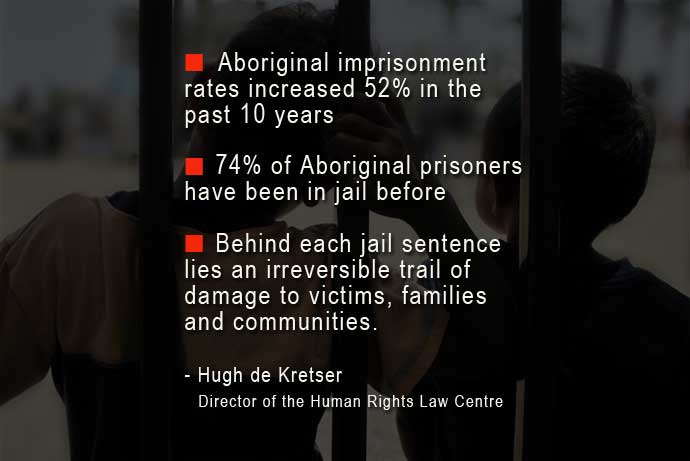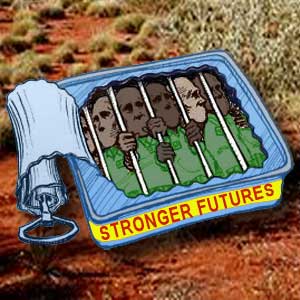First Nations prison rates - Genocide in slow and painful motion
It seems it's easier to abandon evidence about what works in favour of lazy, non-solutions with labels like "name and shame", "boot camp" and "three strikes" that are perceived to be popular with voters.

Tony Abbott's promise of being a "Prime Minister for Aboriginal Affairs" didn't start well, with announced cuts of $42 million to Aboriginal legal services. If Aboriginal people can't access decent legal representation they are more likely to go to jail and for longer.

How to break the cruel cycle of Indigenous imprisonment
Hugh De Kretser The Australian 27 September
It's the slow grind of the criminal justice system on Aboriginal and Torres Strait Islander people played out in Australian courts every day.
I'm in the Cairns Magistrates Court and the first case is a man who breached his bail conditions by reporting to the police station an hour away at Mossman instead of at Cairns. He had asked, via his lawyer, to change his reporting but the police refused and when they told him he had to go to Cairns instead, he got angry, created a scene and was charged with breaching bail and public nuisance.
After two days locked in police cells, his case comes up and he pleads guilty. His Aboriginal legal service lawyer says his Centrelink income is about $240 a week. The magistrate fines him $400 and knowing he can't pay, tells him he can apply to convert the fine to community work. Under Queensland law, he'll also have to pay an automatic $100 offender levy.
The next man, a father of six with a serious hearing impairment, is charged with drinking in public and assaulting police after he struck at the arm of a police officer who tried to take his wine.
No one can understand his garbled response when the magistrate asks him how he pleads. He has a history of drinking and public order offences. His Centrelink income is about $300 a week and he's fined $600. I doubt he heard or understood a word said in the entire hearing. He'll also have to pay the $100 offender levy.
The magistrate is white. The police prosecutor is white. All the people waiting to plead guilty, except for one, are black.
I sit through a handful of cases that reinforce the conclusion that the court is going through the motions, applying inflexible orders with escalating consequences that do nothing to address the causes of crime in disadvantaged, often chaotic lives.
There is an underlying certainty that the same people will reappear in court for more of the same inflexible approaches and many will end up in police cells or jail. There must be a better way - and there is.
Across the country, new justice approaches are steering offenders towards productive, crime-free lives.
Melbourne's Neighbourhood Justice Centre puts housing, mental health, financial counselling and drug and alcohol programs at the court's disposal. Combined with flexible new community corrections orders, the court can tailor orders to individuals to address the causes of offending.
Given community corrections is only 7 per cent of the cost of prison, it's a cost effective way to respond to crime.
More importantly, it's the right way to protect community safety and avoid future victims of crime. An evaluation showed that offenders going through the centre's programs were 14 per cent less likely to offend. A similar program at three other Victorian courts showed a 20 per cent reduction in reoffending. The NSW Drug Court shows even better results with a 37 per cent reduction in reoffending.
You would think that with results like this, rational politicians would be eager to expand these programs. Instead, it's a battle to save them.
Last year, the Queensland government abolished its successful Drug, Murri and Special Circumstances Courts and the Northern Territory government recently did the same to its specialist drug and alcohol court. Both governments ramped up so-called "tough on crime" initiatives.
It seems it's easier to abandon evidence about what works in favour of lazy, non-solutions with labels like "name and shame", "boot camp" and "three strikes" that are perceived to be popular with voters.
The stakes are high, and nowhere more so than in Indigenous imprisonment.
Aboriginal and Torres Strait Islander people are 15 times more likely to be in jail. An Aboriginal man is more likely to be in jail than enrolled in higher education. While Aboriginal education is improving, Aboriginal imprisonment rates are getting worse, increasing 52 per cent over the past decade; 74 per cent of Aboriginal prisoners have been in jail before and behind each jail sentence lies a irreversible trail of damage to victims, families and communities.
The US has made the mistakes of over-imprisonment, particularly of African-Americans and Hispanics. With bipartisan support, many states are looking at new approaches, like justice reinvestment, to break the cycle.
Justice reinvestment aims to divert blunt prison spending towards cost-effective programs that cut crime such as drug courts, substance abuse programs and prisoner education and transition services.
Evidence from the US shows great promise in reducing prison costs and crime at the same time and US Attorney-General Eric Holder's recent comments show high-level support for the approach.
Tony Abbott's promise of being a "Prime Minister for Aboriginal Affairs" didn't start well, with announced cuts of $42 million to Aboriginal legal services. If Aboriginal people can't access decent legal representation they are more likely to go to jail and for longer.
But the Coalition has shown a willingness to introduce Closing the Gap justice targets that commit government to reducing Aboriginal imprisonment.
With leadership on justice reinvestment, working in partnership with the states, the Abbott government could prevent crime, reduce the Aboriginal jail population and cut our $3 billion annual prison bill at the same time. That would be an agenda worth pursuing.
 Money from Misery - Prison Corporates getting fat
Money from Misery - Prison Corporates getting fat
 How many more suicides will it take?
How many more suicides will it take?

